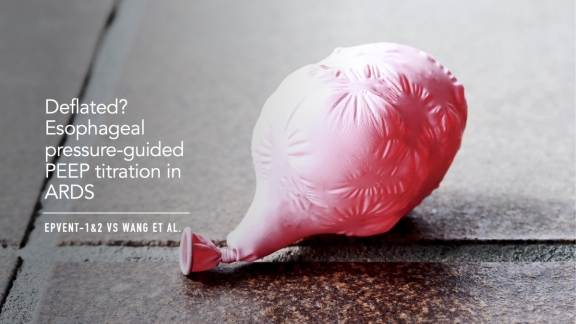A patient is brought in by ambulance in cardiac arrest. As is your practice, you start CPR and focus on bag valve mask ventilation (BVM) while the code gets started. The patient is resuscitated and eventually intubated as they were not conscious after return of spontaneous circulation. You wonder, if use of BVM is associated with an increased risk of pneumonia given that the airway isn’t defended as well compared to a cuffed endotracheal tube.
Read moreSubmitted by Lars-Kristofer Peterson, MD

Article: Targeted Temperature Management for Cardiac Arrest with Nonshockable Rhythm
Read moreSubmitted by Alyse Volino, MD

Article: Targeted Temperature Management for Cardiac Arrest with Nonshockable Rhythm
Read moreSubmitted by Alyse Volino, MD

A 55 yo F with a history of untreated hypothyroidism presents to the ED with fatigue, SOB, abdominal distension and lower extremity edema.
Read moreSubmitted by Eric Chavis, MD

Today, we're recycling an oldie but goodie: A simple algorithm to determine the cause of a red eye.
Read moreSubmitted by Alexis Pelletier-Bui, MD

Lung protective ventilation limiting tidal volume and plateau pressure improves survival in ARDS. The application of positive end-expiratory pressure (PEEP) further stabilizes the lung by preventing alveolar collapse during expiration, thereby reducing cyclic atelectasis. However, the optimal approach to PEEP titration to minimize ventilator-induced lung injury (VILI) has not been delineated. The EPVent-1 trial demonstrated that esophageal pressure-guided PEEP titration was feasible and safe with a trend toward increased survival and improved oxygenation in mild to moderate ARDS. However, interest in esophageal manometry in ARDS was deflated by the more recent EPVent-2 trial demonstrating no improvement in a composite outcome incorporating mortality and ventilator-free days in patients with moderate to severe ARDS. A new randomized control trial published last week by Wang et al. examined the role of esophageal manometry-guided PEEP titration in a novel subset of severe ARDS patients treated with VV ECMO.
Read moreSubmitted by Emily Damuth, MD

A 5 yo with a hx of sickle cell disease presents with diffuse pain.
Read moreSubmitted by Sandhya Ashokkumar, MD

Not a common inner-city emergency, but certainly something you'll see elsewhere. Removing an embedded fishhook can be surprisingly tricky - here are a few methods to know!
Read moreSubmitted by Alison Jaworski, MD
A 46 year old woman arrives at the ED with hives, hypotension, difficulty breathing, and stridor after eating dinner with her family. She is allergic to shrimp, and thought she had avoided it when she ordered from her favorite restaurant. However, shrimp dishes are on the menu and she wonders if there was cross contamination. Unfortunately, she couldn’t find her epinephrine auto-injector at home so her family drove her to the ED. Immediately recognizing anaphylaxis, you give her a dose of IM epinephrine and she improves within several minutes. After seeing she has stabilized, you wonder how long should she be observed and what the evidence is behind the use of antihistamine and glucocorticoid therapy.
Read moreSubmitted by Lars-Kristofer Peterson, MD


